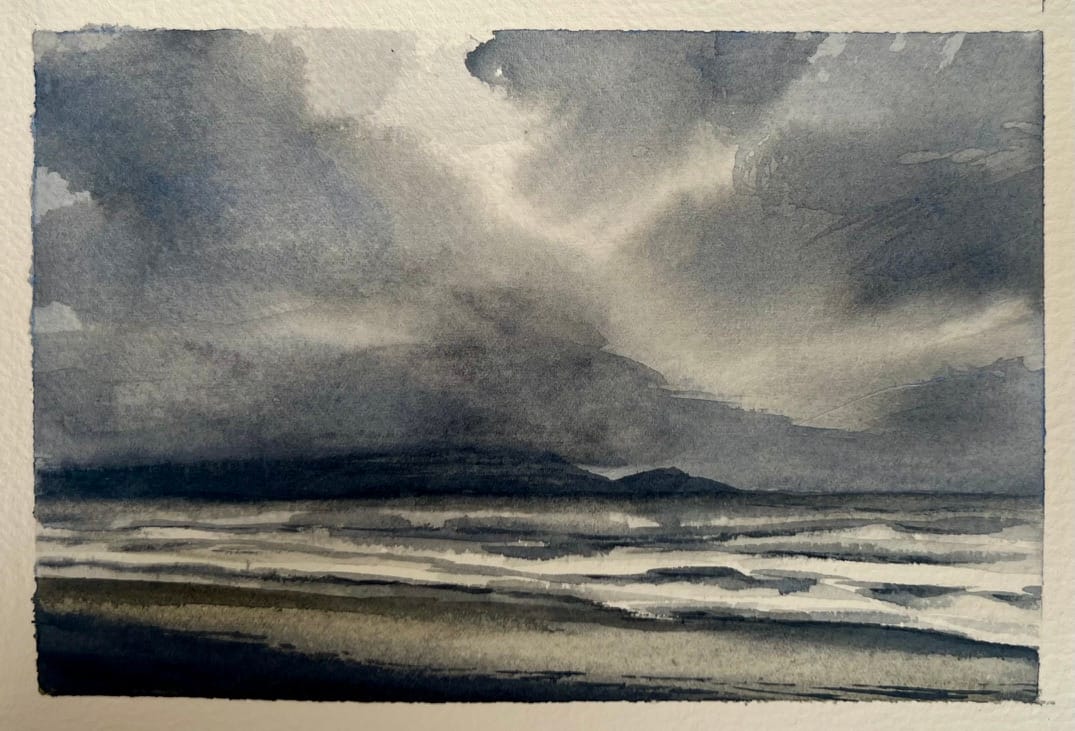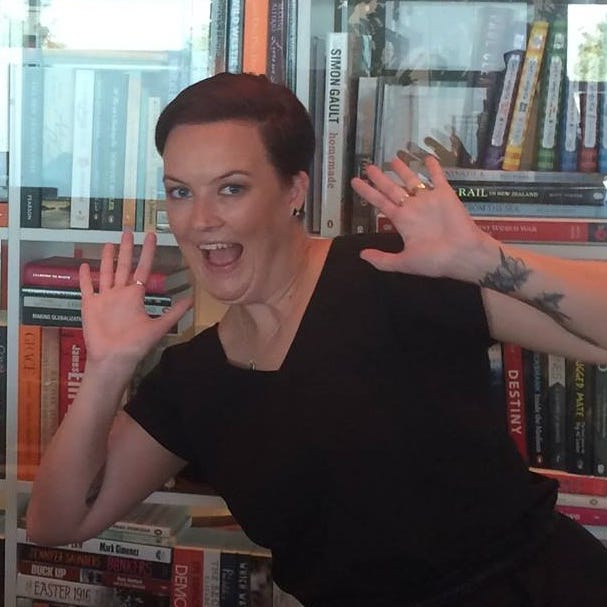Heavy lifting
Every other day, I leave the box I live in, get into a box with wheels, and travel to another box, where the heavy things are.

Every other day, I leave the box I live in, get into a box with wheels, and travel to another box, where the heavy things are.
Once there, I pick up the heavy things and put them down. I do this again and again.
It is as exciting as it sounds.
But if I don’t do this, I will not be as strong as I would like to be, and my back will hurt, and I will become grumpy and fretful, and I will not look the way I want to look.
Plodding amongst the heavy things, my mind wanders to what I have been reading.
I think Naomi Klein is the greatest intellectual of the 21st century, which sounds much too wanky. So let me put it another way: I think she is brave and clever, and she writes books I cannot stop thinking about, that perfectly articulate and go some way to explain and perhaps even fix the sheer state of — well, just look around you.
Her latest book is called Doppelganger. It is about doubles, the strange way that our society constructs fake problems that reflect very real ones, and lifts up people and organisations who champion the twisted, backwards values of this mirror world.
And there are many reflections on branding, on influencers, and on self-improvement.
She writes:
It has often struck me, as I have contemplated my own branding crisis at a time when I felt I should be more properly focused on the climate crisis, that I am hardly the only one who has turned away large fears in favor of more manageable obsessions. In fact, it makes a certain kind of sick sense that our era of peak personal branding has coincided so precisely with an unprecedented crisis point for our shared home. The vast, complex planetary crisis requires coordinated, collective effort on an international scale. That may be theoretically possible, but it sure is daunting. Far easier to master our self, the Brand Called You—to polish it, burnish it, get the angle and affect just right, wage war against all competitors and interlopers, project the worst onto them. Because unlike so much else upon which we might like to have some sort of impact, the canvas of the self is compact and near enough that it feels like we might actually pull off some measure of control. Even though, as I have discovered, this, too, is a grand illusion.
And so the question remains: What aren't we building when we are building our brands?
And as I lift heavy weights on to a heavy bar to make it much heavier I think: what aren’t I building when I’m in this box building muscles?
They say “may you live in interesting times” is a curse, and it is, but I feel like “may you always feel like you should be doing something else,” carries almost as much, uh, weight.
This, combined with the gym’s tyrannical boredom, always has me on the cusp of not going.
But I carry a book with me, and in the book are numbers. They tell the weight of the heavy things, and the number of times I have picked them up and put them down again.
My job is to make the numbers go up.
This is very difficult, and the difficulty almost makes the boredom tolerable, while simultaneously creating a powerful desire to go home.
And yet, when the numbers do go up, there’s a good buzz in the brain. Progress! A tangible difference! Something that’s not getting so much fucking worse!
Klein writes:
In Natural Causes: An Epidemic of Wellness, the Certainty of Dying, and Killing Ourselves to Live Longer, Barbara Ehrenreich, who died in September 2022, tracked the ways that the quest for health and wellness became obsessive pursuits in the Reagan and Thatcher era and has only grown in influence since. She argued that this turn was a reaction [to] the failures of revolutionary movements, when the high hopes of the 1960s and '70s slammed into the brick wall of '80s neoliberalism.
With dreams of justice dashed, along with collective visions for a good life, it was everyone for themselves—a world of atomized individuals climbing over one another to get an edge in newly deregulated, precarious job markets. It was in this context, she argued, that so many turned their attention toward perfecting the body, with treadmills replacing protest marches and free weights replacing free love. The pressures were far greater for women at the start, but soon enough even heterosexual cis men would face their own unattainable fitness and beauty standards and myths. For Ehrenreich, this was all “part of a larger withdrawal into individual concerns after the briefly thrilling communal uplift some had experienced in the 1960s ... If you could not change the world or even chart your own career, you could still control your own body—what goes into it and how muscular energy is expended.”
File as “too real,” I think, when I read this. We are beset by crisis, are quite literally awash in it, and the response of most so-called leaders is — almost invariably — to blithely make things much worse. Apart from the kabuki performance of voting every three years, and increasingly tormented howling at the abyss of optics-obsessed political media, there isn’t much I feel like I can do. Attempting self-improvement in the face of climate change, disasters, and genocide often seems like folly, but the bigger folly might be to do nothing. At the gym, I can make the weights go up, and the numbers get bigger, and (should I make an alliance with my constant nemesis, consistency) strength will follow. And it seems to help with the back pain I get from all the sitting and writing I do.
Explaining her own longtime, often conflicted relationship with the gym, Ehrenreich wrote: “I may not be able to do much about grievous injustice in the world, at least not by myself or in very short order. but I can decide to increase the weight on the leg press machine by twenty pounds and achieve that within a few weeks.”
I have never been a gym rat, but I can relate… As the climate crisis accelerates, with the land heaving beneath us and burning around us, I expect that many of us will continue to find comfort in whatever small bodily obeyances we can muster. There is solace to be found there.
There is a solace to be found at the gym. And a silence, in the sense that I wear noise-cancelling headphones and listen to a lot of Rage Against The Machine. I tell myself it’s because the gym music sucks (it does) but really it’s so I can pretend to be alone.
I head towards a machine and prepare to rage at it. I don’t know what its name is. All I know is that’s where I do my genuflections, Cable Bicep Curl and Cable Tricep Push-down. There’s a bloke standing at the machine, also wearing headphones. I point. He raises his index finger. One set left. He finishes, I take over. Not a word between us.
Klein writes:
For the person dedicating themselves to transformation through diet and fitness, there is you as you are now, and—ever present—there is you as you imagine you could be, with enough self-denial and self-discipline, enough hunger and enough reps. A better, different you, always just out of reach. Ehrenreich wrote evocatively of the strange silence of gyms, a place where people gather together in close quarters but barely speak to one another except to negotiate access to machines. This, she observed, is because the primary relationship at play is not between separate people working out, but between the person working out and themselves as they wish to be, their body double.
Sometimes it seems, in a broken society to which There Is No Alternative, that even the autonomous zone of the self is increasingly illusory and compromised.
Occasionally at the gym, usually in between sets, I feel the guilt of having spare time and cash to spend on making myself bigger and stronger. This is privilege, of course. Self-improvement itself often seems like something only the privileged have the privilege to be interested in.
I tell myself there are some privileges no-one should have, and there are some privileges everyone should have.
Everyone should have enough.
Lots don’t, I think, as I buy myself vegan protein powder in a plastic packet.
Klein writes:
In many ways, the most successful influencers in the wellness and fitness worlds—the people who make fortunes from selling idealized versions of themselves and the idea that you, too, can attain nirvana through a project of perpetual self-improvement—are a perfect fit with far-right economic libertarians and anarcho-capitalists, who also fetishize the individual as the only relevant social actor. In neither worldview is there any mention of collective solutions or structural changes that would make a healthy life possible for all.
Eventually my streak of gym-every-other-day falls apart. I get a cold and spend a week crook. I write one of my howling into the void articles, and then there’s an election. If you’re a climate change enjoyer, the result is thrilling. Slightly disturbed by the number of people who (accurately) describe my writing as grim, I write a follow-up that’s intended to be the opposite of grim:
Apparently that one makes people cry. Heads you win, tails I lose.
Over this time, my self-improvement newsletter languishes. It is hard to write about self-improvement when you feel like you’re not improving yourself. And it’s hard to go to the gym when you’d much prefer to go with mates but no-one can ever organise to do anything at the same time and the thought of talking to random gym-goers makes you want to puke.
Often, it feels like the only accessible community is in the increasingly fraught world of our smartphones.
I usually leave my phone in my bag when I’m at the gym, because if I look at it I get caught up in some aspect of our world’s perma-crisis, some humbug or stupidity or cruelty or ecocide or genocide, and the session takes twice as long. And I might be tempted to take a selfie, to feed Instagram with Content and build a Brand.
Our addiction to digital media, our desire to offer up bits of ourselves to a digital machine in return for enough clout to make a crust, is itself a kind of doubling, Klein writes:
At best, a digital doppelganger can deliver everything our culture trains us to want: fame, adulation, riches. But it's a precarious kind of wish fulfilment, one that can be blown up with a single bad take or post.
The fear of the bad take. I get it. I have been wanting to write something about the horrors taking place in Palestine and Israel1 — vicious attacks perpetrated by cruel men that take the lives of thousands of innocent people — and find myself warned off by the fact that to express an incorrect opinion about this mass murder is to open yourself to vitriol, and yet to not post about it is seen as a betrayal, a refusal to bear witness. For — of course — we should not ignore what’s taking place: the murder of civilians, collective punishment, the destruction of homes and hospitals, the holding of hostages, the denial of aid, and near-constant dehumanisation, among a cornucopia of other crimes. But how much witness-bearing can you bear?
A glance at my feed will reveal videos of frightened children whose parents have been killed, and traumatised parents covered in the blood of their children, who were so desperate for some scrap of justice that they felt the only avenue left was to show the world their agony. It makes me weep.
It’s not done to shed tears at the gym.
I also think: This guy! He stopped going to the gym because he’s sad about Palestine? Waah!
My suffering is that I’m sad about their suffering, and their suffering is that their homes and families are being callously destroyed. It’s not comparable. I feel fury at what’s being done, and simultaneously feel bad for not feeling bad enough. And I think: sort it out, dickhead! It’s not about you!
But you can’t separate your self from the world, there’s no objective view to take, you can’t get out of your head, and all anyone ultimately has is some ability to choose how they react, and what to say.
I stay in my box, where no bombs are falling, where my child is safe, and — apart from the obligatory sharing on social media, and some impassioned conversations with friends and family — I say nothing.
Unlike me, Naomi Klein is brave and articulate. In a Guardian column, she offers the best opinion I’ve yet read on the horror in Palestine.
[A]ntisemitism (besides being hateful) is the rocket fuel of militant Zionism.
What could lessen its power, drain it of some of that fuel? True solidarity. Humanism that unites people across ethnic and religious lines. Fierce opposition to all forms of identity-based hatred, including antisemitism. An international left rooted in values that side with the child over the gun every single time, no matter whose gun and no matter whose child. A left that is unshakably morally consistent, and does not mistake that consistency with moral equivalency between occupier and occupied. Love.
After more than a week away from the House of Heavy Things I start to feel it. That spot in between my spine and left shoulder-blade starts its constant muttering and needling. Lifting weights in an airless box might have given me the latest in the long line of colds I’ve had this year; and yet, not going to the gym is making me sick. I need to get back to it, less because I want to grow new and interesting additions to my body, and more because feeling strong makes the load of life more bearable.
Naomi Klein writes of the tendency to avoid reality, of the urge to vanish into a mirror-world of fake news that’s somehow more bearable than the real news, and the way that inhabiting our own bodies can feel unbearable:
At bottom, it comes down to who and what we cannot bear to see—in our past, in our present, and in the future racing toward us…
We avoid because we do not want to be bodies like that. We do not want our bodies to participate in mass extinction. We do not want our bodies to be wrapped in garments made by other bodies that are degraded, abused, and worked to exhaustion. We do not want to ingest foods marred by memories of human and nonhuman suffering. We do not want the lands we live on to be stolen and haunted.
And she continues, showing how self-improvement itself can be a form of avoidance; instead of being drawn into a mirror world, one is drawn — like Narcissus — into a mere mirror.
Indeed, a central reason why so many of us cannot bear to look at the Shadow Lands is that we live in a culture that tells us to fix massive crises on our own, through self-improvement.
Support labor rights by ordering from a different store. End racism by battling your personal white fragility—or by representing your marginalized identity group in elite spaces. Transcend your ego with a meditation app.
Some of it will help — a bit. But the truth is that nothing of much consequence in the face of our rigged systems can be accomplished on our own—whether by our own small selves or even by our own identity groups. Change requires collaboration and coalition, even (especially) uncomfortable coalition. Mariame Kaba, a longtime prison abolitionist who has done as much as anyone to imagine what it would take to live in a world that does not equate safety with police and cages, puts the lesson succinctly, one passed on to her by her father: “Everything worthwhile is done with other people.”
I go back to the gym, on my own. Surprisingly, I manage to lift heavier heavy things and make the numbers bigger than all previous attempts.
It makes my back feel a bit better.
And in the muscle-trembling, delirious boredom of the mid-set break, I think — as I always do — of the ways in which, even when we feel alone, we can find other people to do something worthwhile with.
If you want a way to protest or to do something worthwhile about the human tragedy taking place in the Middle East, Emily Writes has resources and recommended actions to take:
Feel free to feed back — as usual, comments are open and free — but know I’ll be keeping a very careful eye on them. The comments here are almost always thoughtful and kind but I do have to warn that Antisemitism or Islamophobia or excusing war crimes will not be welcome.
That said, feel free to talk about things in the comments that are not related to crises. If people want to chat about how many push-ups they can do now, I’m all ears.
I hate that I even have to do this, and I am extremely conscious of the fact that it’s absurd for a self-improvement newsletter to sound like a diplomatic speech, but if I don’t do this someone will lose it. I condemn Hamas for their war crimes and for their autocratic, anti-democratic rule of Gaza. I condemn Israel’s leadership for their war crimes, and also for turning Gaza into an open-air prison, and for their near-constant flouting of UN General Assembly resolutions and international law in general. I’m convinced that you should be able to say “war crimes are bad” without referring specifically to whose crimes, but apparently people think that the righteousness of their cause cancels out their war crimes. ↩







